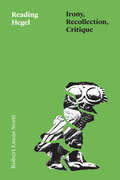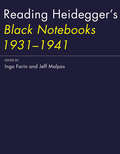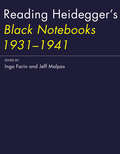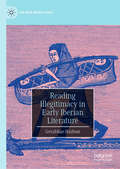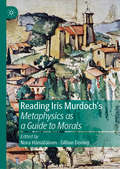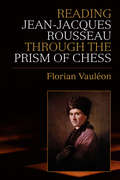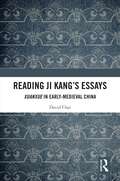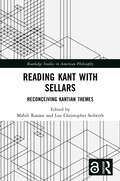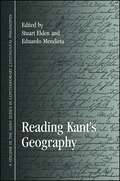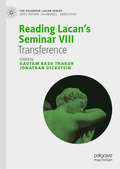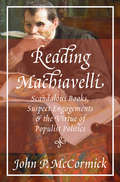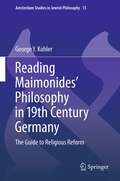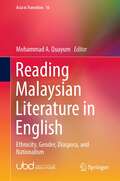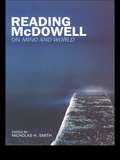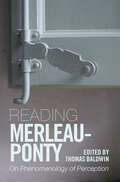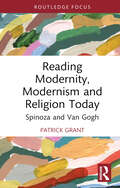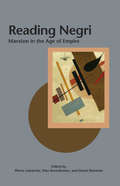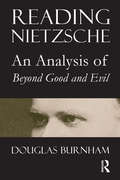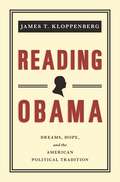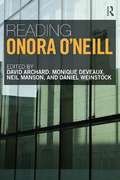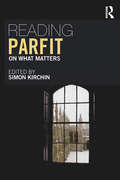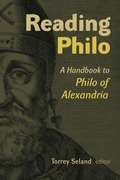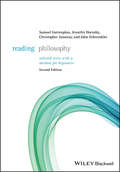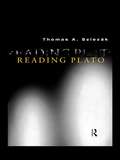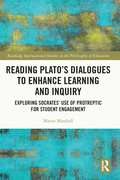- Table View
- List View
Reading Hegel: Irony, Recollection, Critique (Thinking Literature)
by Robert Lucas ScottRetrieves Hegelian speculative experience for literary theory. The relationship between Hegel and literary theory has for a long time been both contested and paradoxical. On the one hand, “theory” is often skeptical of all that Hegel ostensibly stood for: idealism, systematicity, and identity at the expense of difference. Yet, in spite of itself, literary theory is taken to owe a profound debt to Hegel’s philosophy. Robert Lucas Scott’s book complicates this account and argues that literary theory has made the mistake of abstracting Hegel’s thought from its more dynamic presentation in Hegel’s writings, reducing “Hegel” to a series of propositions or positions. Literary theory, Scott argues, misses what is perhaps the greatest innovation of Hegel’s philosophy: a presentation of experience that begins precisely by setting aside all preconceptions or prior assumptions. It is on this point that Hegel’s philosophy itself approaches literature: its content cannot be simply abstracted from the singular experience of reading it. Only through a mode of reading alive to speculative experience can literary theory become truly Hegelian. Scott’s exposition of Hegel offers a model of reading with relevance beyond philosophy: one that is critical without pretensions of mastery and detachment and that honors the singularity of the reading experience without succumbing to the subjectivism of the “postcritical.” The book also includes engagements with the work of Luther, Kant, Marx, Gillian Rose, Fredric Jameson, Robert Brandom, Catherine Malabou, and more in its recovery of Hegel’s thought for a critical understanding of our time.
Reading Heidegger's Black Notebooks 1931--1941
by Jeff Malpas Ingo FarinFor more than forty years, the philosopher Martin Heidegger logged ideas and opinions in a series of notebooks, known as the "Black Notebooks" after the black oilcloth booklets into which he first transcribed his thoughts. In 2014, the notebooks from 1931 to 1941 were published, sparking immediate controversy. It has long been acknowledged that Heidegger was an enthusiastic supporter of the Nazi Party in the early 1930s. But the notebooks contain a number of anti-Semitic passages -- often referring to the stereotype of "World-Jewry" -- written even after Heidegger became disenchanted with the Nazis themselves. Reactions from the scholarly community have ranged from dismissal of the significance of these passages to claims that the anti-Semitism in them contaminates all of Heidegger's work. This volume offers the first collection of responses by Heidegger scholars to the publication of the notebooks. In essays commissioned especially for the book, the contributors offer a wide range of views, addressing not only the issues of anti-Semitism and Nazism but also the broader questions that the notebooks raise.ContributorsBabette Babich, Andrew Bowie, Steven Crowell, Fred Dallmayr, Donatella Di Cesare, Michael Fagenblat, Ingo Farin, Gregory Fried, Jean Grondin, Karsten Harries, Laurence Paul Hemming, Jeff Malpas, Thomas Rohkrämer, Tracy B. Strong, Peter Trawny, Daniela Vallega-Neu, Friedrich-Wilhelm von Herrmann, Nancy A. Weston, Holger Zaborowski
Reading Heidegger's Black Notebooks 1931-1941
by Jeff Malpas edited by Ingo FarinHeidegger scholars consider the philosopher's recently published notebooks, including the issues of Heidegger's Nazism and anti-Semitism.For more than forty years, the philosopher Martin Heidegger logged ideas and opinions in a series of notebooks, known as the “Black Notebooks” after the black oilcloth booklets into which he first transcribed his thoughts. In 2014, the notebooks from 1931 to 1941 were published, sparking immediate controversy. It has long been acknowledged that Heidegger was an enthusiastic supporter of the Nazi Party in the early 1930s. But the notebooks contain a number of anti-Semitic passages—often referring to the stereotype of “World-Jewry”—written even after Heidegger became disenchanted with the Nazis themselves. Reactions from the scholarly community have ranged from dismissal of the significance of these passages to claims that the anti-Semitism in them contaminates all of Heidegger's work. This volume offers the first collection of responses by Heidegger scholars to the publication of the notebooks. In essays commissioned especially for the book, the contributors offer a wide range of views, addressing not only the issues of anti-Semitism and Nazism but also the broader questions that the notebooks raise.ContributorsBabette Babich, Andrew Bowie, Steven Crowell, Fred Dallmayr, Donatella Di Cesare, Michael Fagenblat, Ingo Farin, Gregory Fried, Jean Grondin, Karsten Harries, Laurence Paul Hemming, Jeff Malpas, Thomas Rohkrämer, Tracy B. Strong, Peter Trawny, Daniela Vallega-Neu, Friedrich-Wilhelm von Herrmann, Nancy A. Weston, Holger Zaborowski
Reading Illegitimacy in Early Iberian Literature (The New Middle Ages)
by Geraldine HazbunReading Illegitimacy in Early Iberian Literature presents illegitimacy as a fluid, creative, and negotiable concept in early literature which challenges society’s definition of what is acceptable. Through the medieval epic poems Cantar de Mio Cid and Mocedades de Rodrigo, the ballad tradition, Cervantes’s Novelas ejemplares, and Lope de Vega’s theatre, Geraldine Hazbun demonstrates that illegitimacy and legitimacy are interconnected and flexible categories defined in relation to marriage, sex, bodies, ethnicity, religion, lineage, and legacy. Both categories are subject to the uncertainties and freedoms of language and fiction and frequently constructed around axes of quantity and completeness. These literary texts, covering a range of illegitimate figures, some with an historical basis, demonstrate that truth, propriety, and standards of behaviour are not forged in the law code or the pulpit but in literature’s fluid system of producing meaning.
Reading Iris Murdoch's Metaphysics as a Guide to Morals
by Nora Hämäläinen Gillian DooleyMetaphysics as a Guide to Morals was Iris Murdoch’s major philosophical testament and a highly original and ambitious attempt to talk about our time. Yet in the scholarship on her philosophical work thus far it has often been left in the shade of her earlier work. This volume brings together 16 scholars who offer accessible readings of chapters and themes in the book, connecting them to Murdoch’s larger oeuvre, as well as to central themes in 20th century and contemporary thought. The essays bring forth the strength, originality, and continuing relevance of Murdoch’s late thought, addressing, among other matters, her thinking about the Good, the role and nature of metaphysics in the contemporary world, the roles of art in human understanding, questions of unity and plurality in thinking, the possibilities of spiritual life without God, and questions of style and sensibility in intellectual work.
Reading Jean-Jacques Rousseau through the Prism of Chess
by Florian VauléonOver a period of forty years, Rousseau combined his devotion to writing with his enthusiasm for chess, and these two passions necessarily intertwined. Rousseau was able to transfer his power of concentration and the strict dialectics of his literary writings to his chess strategy. If Rousseau’s analytical skills influenced his attitude toward the game, then the game of chess inspired his logic and affected his discourse. Interpreted as a form of rationality, as a conceptual paradigm, the rules and strategies of chess accurately describe Rousseau’s ideas for social management, political power, and organization. Reading Jean-Jacques Rousseau through the Prism of Chess shows that Rousseau’s political theory, though allegedly inspired by Nature, found a perfect model in a game created by mankind; chess thus became a reference for his philosophical discourse and practice as well as a method to systematize Nature and organize society.
Reading Ji Kang's Essays: Xuanxue in Early Medieval China
by David ChaiThis is the first English-language book on the philosophy of Ji Kang. Moreover, it offers the first systematic treatment of his philosophy, thus filling a significant gap in English-language scholarship on early medieval Chinese literature and philosophy. David Chai brings to light Ji Kang’s Neo-Daoist heritage and explores the themes in his writings that were derived from classical Daoism, most notably the need for humanity to return to a more harmonious co-existence with Nature to further our own self-understanding. His analysis is unique in that it balances translation and annotation with expositing the creative philosophizing of Neo-Daoism. Chai analyzes the entirety of Ji Kang’s essays, exploring his philosophical reflections on music, aesthetics, ethics, self-cultivation, and fate. Reading Ji Kang/s Essays will be of interest to scholars and students of Chinese philosophy and literature. It offers the first comprehensive philosophical examination of a heretofore neglected figure in Neo-Daoism.
Reading Kant with Sellars: Reconceiving Kantian Themes (Routledge Studies in American Philosophy)
by Luz Christopher Seiberth Mahdi RanaeeThis book considers Wilfrid Sellars’ engagement with Kantian philosophy—both theoretical and practical—in his exegetical work in reading Kant as well as in his own systematic development of Kantian philosophy.Despite the spate of new publications on Wilfrid Sellars’ role in 20th-century philosophy, a comprehensive book-length examination of his interpretation of Kant has been conspicuously absent. This volume fills that gap both exegetically and systematically, exploring his engagement in four distinct sections: (1) Logic and History; (2) Sensations and Intuitions; (3) Being and Categories; and (4) Reason, Modality, and Freedom. The chapters within these sections, written by leading experts, explore Sellars’ reading of Kant and offer both defenses and critiques. Readers will find in this collection not only a thorough exploration of Sellars’ engagement with Kant, but also a rich dialogue between Kant scholars and specialists in Sellars’ philosophy.Reading Kant with Sellars is essential reading for Kant and Sellars scholars, offering them deeper insights into their respective fields by highlighting the importance of Kant for Sellars and the relevance of Sellars’ reading of Kant for Kant scholarship. It will also appeal to scholars and advanced students in philosophy of mind, philosophy of language, epistemology, moral and practical philosophy, and logic.Chapter 8 of this book is freely available as a downloadable Open Access PDF at http://www.taylorfrancis.com under a Creative Commons Attribution (CC BY-NC-ND) 4.0 license. The funder for this chapter is Digitales Kant-Zentrum NRW (Kant and Cognitive Science), funded by the Ministry of Culture and Science of the State of North Rhine-Westphalia.
Reading Kant's Geography (SUNY series in Contemporary Continental Philosophy)
by Eduardo Mendieta Stuart EldenFor almost forty years, German enlightenment philosopher Immanuel Kant gave lectures on geography, more than almost any other subject. Kant believed that geography and anthropology together provided knowledge of the world, an empirical ground for his thought. Above all, he thought that knowledge of the world was indispensable to the development of an informed cosmopolitan citizenry that would be self-ruling. While these lectures have received very little attention compared to his work on other subjects, they are an indispensable source of material and insight for understanding his work, specifically his thinking and contributions to anthropology, race theory, space and time, history, the environment and the emergence of a mature public. This indispensable volume brings together world-renowned scholars of geography, philosophy and related disciplines to offer a broad discussion of the importance of Kant's work on this topic for contemporary philosophical and geographical work.
Reading Lacan’s Seminar VIII: Transference (The Palgrave Lacan Series)
by Gautam Basu Thakur Jonathan DicksteinThis book provides 18 lively commentaries on Lacan’s Seminar VIII, Transference (1960-61) that explore its theoretical and philosophical consequences in the clinic, the classroom, and society. Including contributions from clinicians as well as scholars working in philosophy, literature, and culture studies, the commentaries presented here represent a wide-range of disciplinary perspectives on the concept of transference. Some chapters closely follow the structure of the seminar’s sessions, while others take up thematic concerns or related sessions such as the commentary on sessions 19 to 22 which deal with Lacan’s discussion of Claudel’s Coûfontaine trilogy. This book is not a compendium to Lacan’s seminar. Instead it attempts to capture through shorter contributions a spectrum of voices debating, deliberating, and learning with Lacan’s concept. In doing so it can be seen to engage with transference conceptually in a manner that matches the spirit of Lacan’s seminar itself.The book will provide an invaluable new resource for Lacan scholars working across the fields of psychoanalytic theory, clinical psychology, philosophy and cultural studies.
Reading Machiavelli: Scandalous Books, Suspect Engagements, and the Virtue of Populist Politics
by John P. McCormickTo what extent was Machiavelli a “Machiavellian”? Was he an amoral adviser of tyranny or a stalwart partisan of liberty? A neutral technician of power politics or a devout Italian patriot? A reviver of pagan virtue or initiator of modern nihilism? Reading Machiavelli answers these questions through original interpretations of Niccolò Machiavelli’s three major political works—The Prince, Discourses, and Florentine Histories—and demonstrates that a radically democratic populism seeded the Florentine’s scandalous writings. John McCormick challenges the misguided understandings of Machiavelli set forth by prominent thinkers, including Jean-Jacques Rousseau and representatives of the Straussian and Cambridge schools.McCormick emphasizes the fundamental, often unacknowledged elements of a vibrant Machiavellian politics: the utility of vigorous class conflict between elites and common citizens for virtuous democratic republics, the necessity of political and economic equality for genuine civic liberty, and the indispensability of religious tropes for the exercise of effective popular judgment. Interrogating the established reception of Machiavelli’s work by such readers as Rousseau, Leo Strauss, Quentin Skinner, and J.G.A. Pocock, McCormick exposes what was effectively an elite conspiracy to suppress the Florentine’s contentious, egalitarian politics. In recovering the too-long-concealed quality of Machiavelli’s populism, this book acts as a Machiavellian critique of Machiavelli scholarship.Advancing fresh renderings of works by Machiavelli while demonstrating how they have been misread previously, Reading Machiavelli presents a new outlook for how politics should be conceptualized and practiced.
Reading Maimonides' Philosophy in 19th Century Germany
by George Y. KohlerThis book investigates the re-discovery of Maimonides' Guide of the Perplexed by the Wissenschaft des Judentums movement in Germany of the nineteenth and beginning twentieth Germany. Since this movement is inseparably connected with religious reforms that took place at about the same time, it shall be demonstrated how the Reform Movement in Judaism used the Guide for its own agenda of historizing, rationalizing and finally turning Judaism into a philosophical enterprise of 'ethical monotheism'. The study follows the reception of Maimonidean thought, and the Guide specifically, through the nineteenth century, from the first beginnings of early reformers in 1810 and their reading of Maimonides to the development of a sophisticated reform-theology, based on Maimonides, in the writings of Hermann Cohen more then a hundred years later.
Reading Malaysian Literature in English: Ethnicity, Gender, Diaspora, and Nationalism (Asia in Transition #16)
by Mohammad A. QuayumThis book brings together fourteen articles by prominent critics of Malaysian Anglophone literature from five different countries: Australia, Italy, Malaysia, Singapore, and the US. It investigates the thematic and stylistic trends in the literary products of selected writers of the tradition in the genres of drama, fiction, and poetry, from its beginnings to the present, focusing mainly on the postcolonial themes of ethnicity, gender, diaspora, and nationalism, which are central to the creativity and imagination of these writers. The book explores the works of not just the established writers of the tradition but also those who have received little critical attention to date but who are equally gifted, such as Adibah Amin, Edward Dorall, Rehaman Rashid, and Huzir Suleiman. The chapters collectively address the challenges and achievements of writers in the English language in a country where English is widely used in daily life and yet marginalised in the creative domain to elevate the status of writings in the national language, i.e., Bahasa Malaysia. The book will demonstrate that in spite of such recurrent neglect of the medium, Malaysia has produced a number of outstanding writers in the language, who are comparable in creativity and craftsmanship to writers of other Anglophone traditions. The book will be of interest to readers and researchers of Malaysian literature, postcolonial literatures, minority literatures, gender studies, and Southeast Asian studies.
Reading McDowell: On Mind and World
by Nicholas H. SmithReading McDowell: On Mind and World brings together an exceptional list of contributors to analyse and discuss McDowell's challenging and influential book, one of the most influential contributions to contemporary philosophy in recent years. In it McDowell discusses issues in epistemology, philosophy of mind and ethics as well as surveying the broader remit of philosophy. Reading McDowell clarifies some of these themes and provides further material for debate across philosophy of mind, ethics, philosophy of language and epistemology.The internationally renowned contributors include: Richard Bernstein, Gregory McCulloch, Hilary Putnam, Charles Taylor, Crispin Wright, Jay Bernstein, Rudiger, Bubner, Robert Pippin, Charles Lamour, Axel Honneth, Barry Stround, Robert Brandom and Michael Williams. In conclusion, John McDowell responds to all the contributions.This critical contribution to analytic philosophy is likely to shape philosophical debate for years to come. It will be of interest to professional philosophers, as well as students of contemporary epistemology, philosophy of mind and ethics.
Reading Merleau-Ponty: On Phenomenology of Perception
by Thomas BaldwinMaurice Merleau-Ponty's Phenomenology of Perception is widely acknowledged to be one of the most important contributions to philosophy of the twentieth century. In this volume, leading philosophers from Europe and North America examine the nature and extent of Merleau-Ponty's achievement and consider its importance to contemporary philosophy. The chapters, most of which were specially commissioned for this volume, cover the central aspects of Merleau-Ponty's influential work. These include: Merleau-Ponty’s debt to Husserl Merleau-Ponty’s conception of philosophy perception, action and the role of the body consciousness and self-consciousness naturalism and language social rules and freedom. Contributors: David Smith, Sean Kelly, Komarine Romdenh-Romluc, Hubert Dreyfus, Mark Wrathall, Thomas Baldwin, Simon Glendinning, Naomi Eilan, Eran Dorfman, Francoise Dastur
Reading Modernity, Modernism and Religion Today: Spinoza and Van Gogh (Routledge Focus on Literature)
by Patrick GrantFeelings of rootlessness, fragmentation and loneliness are endemic in today’s secular societies. In the late nineteenth century, Émile Durkheim described this kind of social malaise as anomie, a concept this book locates within a historical narrative of the emergence of Modernism from Modernity. The book focuses on two representative figures, Benedictus de Spinoza and Vincent van Gogh, on whose works it offers significant new perspectives. Spinoza drew up a blueprint for Modernity, which is to say, the cultural transformations that took place as a result of the Scientific Revolution and the Protestant Reformation. In counterpoint to his overriding confidence in reason, a persistent current in Spinoza’s writing shows how concerned he was about a possible loss of confidence in his governing idea of a single Substance, the philosophical God, with which he sought to replace the creator God of the Bible. In promoting art as a means of filling the gap left by the absence of Spinoza’s philosophical God and the failures of traditional Christianity, Van Gogh also discovered the limitations of the vocation to which he had dedicated himself. He concluded that in the tension between art and anomie, a new kind of religious sensibility and understanding might emerge. This remains the case in the current postmodern cultural phase when fragmentation and incoherence are summoning up new assessments and re-configurations of values promoting new forms of solidarity, dialogue and religious understanding.
Reading Negri
by David Sherman Pierre Lamarche Max RosenkrantzAntonio Negri is the most important Marxist theorist working today. His writings include novel readings of classical philosophers such as Machiavelli, Descartes, and Spinoza, revolutionary reinterpretations of the central texts of Marx, and works of contemporary political analysis. Negri is known in the English-speaking world primarily through Empire, a work he co-authored with Michael Hardt in 2000 that became a surprise academic best-seller. His other writings, which have great depth and breadth, are equally deserving of attention. While most critical accounts of Negri focus only on Empire, this collection of essays presents readers with a fuller picture of Negri's thought, one that does justice to his ability to use the great texts of the philosophical tradition to illuminate the present. The collection contains essays from scholars representing a broad spectrum of disciplines and interests, and it offers both criticism of and positive commentary on Negri's work.
Reading Nietzsche: An Analysis of "Beyond Good and Evil"
by Douglas Burnham"Beyond Good and Evil" is a concise and comprehensive statement of Nietzsche's mature philosophy and is an ideal entry point into Nietzsche's work as a whole. Pithy, lyrical and densely complex, "Beyond Good and Evil" demands that its readers are already familiar with key Nietzschean concepts - such as the will-to-power, perspectivism or eternal recurrence - and are able to leap with Nietzschean agility from topic to topic, across metaphysics, psychology, religion, morality and politics. "Reading Nietzsche" explains the key concepts, the range of Nietzsche's concerns, and highlights Nietzsche's writing strategies that are the key to understanding his work and processes of thought. In its close analysis of the text, "Reading Nietzsche" reassesses this most creative of philosophers and presents a significant contribution to the study of his thought. In setting this analysis within a comprehensive survey of Nietzsche's ideas, the book is a guide both to this key work and to Nietzsche's philosophy more generally.
Reading Obama: Dreams, Hope, and the American Political Tradition
by James T. KloppenbergA leading intellectual historian traces the origins of Barack Obama’s ideasDerided by the Right as dangerous and by the Left as spineless, Barack Obama puzzles observers. In Reading Obama, James T. Kloppenberg reveals the sources of Obama's ideas and explains why his principled aversion to absolutes does not fit contemporary partisan categories. Obama's commitments to deliberation and experimentation derive from sustained engagement with American democratic thought. In a new preface, Kloppenberg explains why Obama has stuck with his commitment to compromise in the first three years of his presidency, despite the criticism it has provoked.Reading Obama traces the origins of his ideas and establishes him as the most penetrating political thinker elected to the presidency in the past century. Kloppenberg demonstrates the influences that have shaped Obama's distinctive worldview, including Nietzsche and Niebuhr, Ellison and Rawls, and recent theorists engaged in debates about feminism, critical race theory, and cultural norms. Examining Obama's views on the Constitution, slavery and the Civil War, the New Deal, and the civil rights movement, Kloppenberg shows Obama's sophisticated understanding of American history. Obama's interest in compromise, reasoned public debate, and the patient nurturing of civility is a sign of strength, not weakness, Kloppenberg argues. He locates its roots in Madison, Lincoln, and especially in the philosophical pragmatism of William James and John Dewey, which nourished generations of American progressives, black and white, female and male, through much of the twentieth century, albeit with mixed results.Reading Obama reveals the sources of Obama's commitment to democratic deliberation: the books he has read, the visionaries who have inspired him, the social movements and personal struggles that have shaped his thinking. Kloppenberg shows that Obama's positions on social justice, religion, race, family, and America's role in the world do not stem from a desire to please everyone but from deeply rooted—although currently unfashionable—convictions about how a democracy must deal with difference and conflict.
Reading Onora O'Neill
by David Archard Daniel Weinstock Monique Deveaux Neil MansonOnora O’Neill is one of the foremost moral philosophers writing today. Her work on ethics and bioethics, political philosophy and the philosophy of Kant is extremely influential. Her landmark Reith Lectures on trust did much to establish the subject not only on the philosophical and political agenda but in the world of media, business and law more widely. Reading Onora O’Neill is the first book to examine and critically appraise the work of this important thinker. It includes specially commissioned chapters by leading international philosophers in ethics, Kantian philosophy and political philosophy. The following aspects of O’Neill’s work are examined: global justice Kant the ethics of the family bioethics consent trust. Featuring a substantial reply to her critics at the end of the book, Reading Onora O’Neill is essential reading for students and scholars of ethics and political philosophy.
Reading Parfit: On What Matters
by Simon KirchinDerek Parfit was one of the world’s leading philosophers. His On What Matters was the most eagerly awaited book in philosophy for many years. Reading Parfit: On What Matters is an essential overview and assessment of volumes 1 and 2 of Parfit’s monumental work by a team of international contributors, and includes responses by Parfit himself. It discusses central features of Parfit’s book, including the structure and nature of reasons; the ideas underlying moral principles; Parfit’s discussions of consequentialism, contractualism and Kantian deontology; and his metaethical ideas and arguments. Reading Parfit will be central reading for students of ethics and anyone seeking a deeper understanding of one of the most important works of philosophy published in the last fifty years.
Reading Philo: A Handbook to Philo of Alexandria
by Torrey SelandGuidebook par excellence to a significant ancient Jewish scholar A contemporary of both Jesus and the apostle Paul, Philo was a prolific Jewish theologian, philosopher, and politician -- a fascinating, somewhat enigmatic figure -- who lived his entire life in Alexandria, Egypt. His many books are important sources for our understanding of ancient Judaism, early Christianity, and the philosophical currents of that time.Reading Philo is an excellent introductory guide to Philo’s work and significance. The contributors -- all well-known experts on Philo of Alexandria -- discuss Philo in context, offer methodological considerations (how best to study Philo), and explore Philo’s ongoing relevance and value (why reading him is important). This practical volume will be an indispensable resource for anyone delving into Philo and his world.
Reading Philosophy: Selected Texts with a Method for Beginners (Reading Philosophy #4)
by Christopher Janaway Jennifer Hornsby Samuel Guttenplan John SchwenklerA key introductory philosophy textbook, making use of an innovative, interactive technique for reading philosophical texts Reading Philosophy: Selected Texts with a Method for Beginners, Second Edition, provides a unique approach to reading philosophy, requiring students to engage with material as they read. It contains carefully selected texts, commentaries on those texts, and questions for the reader to think about as she reads. It serves as starting points for both classroom discussion and independent study. The texts cover a wide range of topics drawn from diverse areas of philosophical investigation, ranging over ethics, metaphysics, epistemology, philosophy of mind, aesthetics, and political philosophy. This edition has been updated and expanded. New chapters discuss the moral significance of friendship and love, the subjective nature of consciousness and the ways that science might explore conscious experience. And there are new texts and commentary in chapters on doubt, self and moral dilemmas. Guides readers through the experience of active, engaged philosophical reading Presents significant texts, contextualized for newcomers to philosophy Includes writings by philosophers from antiquity to the late 20th-century Contains commentary that provides the context and background necessary for discussion and argument Prompts readers to think through specific questions and to reach their own conclusions This book is an ideal resource for beginning students in philosophy, as well as for anyone wishing to engage with the subject on their own.
Reading Plato
by Thomas A. SzlezákReading Plato offers a concise and illuminating insight into the complexities and difficulties of the Platonic dialogues, providing an invaluable text for any student of Plato's philosophy.Taking as a starting point the critique of writing in the Phaedrus -- where Socrates argues that a book cannot choose its reader nor can it defend itself against misinterpretation -- Reading Plato offers solutions to the problems of interpreting the dialogues. In this ground-breaking book, Thomas A. Szlezak persuasively argues that the dialogues are designed to stimulate philosophical enquiry and to elevate philosophy to the realm of oral dialectic.
Reading Plato's Dialogues to Enhance Learning and Inquiry: Exploring Socrates' Use of Protreptic for Student Engagement (Routledge International Studies in the Philosophy of Education)
by Mason MarshallThis scholarly volume proposes protreptic as a radically new way of reading Plato’s dialogues leading to enhanced student engagement in learning and inquiry. Through analysis of Platonic dialogues including Crito, Euthyphro, Meno, and Republic, the text highlights Socrates’ ways of fostering and encouraging self-examination and conscionable reflection. By focusing his work on Socrates’ use of protreptic, Marshall proposes a practical approach to reading Plato, illustrating how his writings can be used to enhance intrinsic motivation amongst students, and help them develop the thinking skills required for democratic and civic engagement. This engaging volume will be of interest to doctoral students, researchers, and scholars concerned with Plato’s dialogues, the philosophy of education, and ancient philosophy more broadly, as well as post-graduate students interested in moral and values education research.
